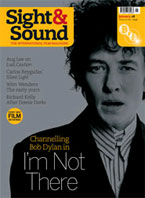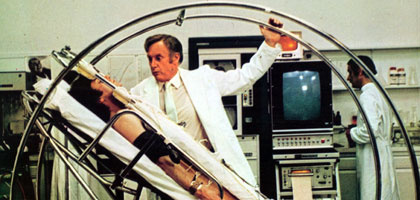Primary navigation


Malcolm McDowell and Lindsay Anderson's follow-up to 'If....' is a film to see when you're young, says Tim Lucas
Lindsay Anderson; UK 1973; Warner Home Video/Region 1; 178 minutes; Aspect Ratio 1.85:1; Features: audio commentary, archival featurette, feature-length profile of Malcolm McDowell, theatrical trailer
After If.... won the Palme d'Or at the 1969 Cannes Film Festival, its cheeky young star Malcolm McDowell suggested to director Lindsay Anderson that they were a good team and should make another film together right away. The phlegmatic Anderson, pointing out that good scripts are rare, challenged the actor to write one, advice presumably a mere degree removed from 'bugger off'.
Anderson had no way of knowing that the actor's idea, based on his early experiences as a coffee salesman and romanced into a picaresque fantasy by If.... scribe David Sherwin, would indeed cause lightning to strike twice. O Lucky Man! wasn't the commercial success its predecessor had been (its nearly three-hour length reduced the number of possible daily screenings by a third), but it told a similarly magic-realist story, on the same socially responsible terms, in more linear and upbeat fashion. Made still more approachable by a charmingly sage pop score by Alan Price (whose band appear on camera throughout the film as a musical Greek chorus), the film became as beloved in its decade as If.... had been to filmgoers of the late 1960s, in essence attending to the continuing adventures of Mick Travis (McDowell) when, after graduating, he steps out into the larger world of business armed only with a smile, a shiny red apple, a magic suit and the ambition to succeed.
O Lucky Man! is generally considered part of an Anderson/Sherwin/McDowell trilogy that began withIf.... and concluded with Britannia Hospital (1982), all three films featuring McDowell as an everyman named Mick Travis. Despite the shared name, he isn't really the same character and the stories aren't sequential; they do however jointly illustrate, through fantasy and comedy, the sobering reality of how our institutions succeed in squelching all that is best in us. Remarkably, the derangement infecting the larger world Travis discovers looked to my 18-year-old eyes like satiric, paranoid excess, but now that I've arrived at the age Anderson himself was when he made the film, the same derangement disconcertingly resembles daily life as I often perceive it. It's the film's triumph that Travis' entanglements with monsters here don't turn him into one; nowhere else in cinema will you find such a bleak worldview infused with such infectious, ebullient, indomitable joy, attentive to the magical propensities of life even when at its darkest.
One of the ways this magic is conveyed is through the brilliant theatrical conceit of having the same actors play a variety of roles (Arthur Lowe actually turns up in blackface as an African businessman), thereby encoding Travis' world with archetypes (Peter Jeffrey as the surrogate fathers, Mary MacLeod the surrogate mothers, Ralph Richardson as opportunity, Graham Crowden as genius, Helen Mirren as romantic ambition) that can be read as opportunities for Travis to learn from past mistakes. The film's theme of luck is further supported by the recasting of faces familiar not only from If.... (Christine Noonan, Mona Washbourne) but also from McDowell's subsequent success, A Clockwork Orange (Warren Clarke, Philip Stone). Indeed, the story's narrative arc is rather an inversion of the Kubrick film, chronicling the hero's systematic (or is it systematised?) loss of innocence and the sharp pain to his gulliver that sets him back on track.
The film has been given a colourful anamorphic 1.85:1 transfer so lifelike that threads of grey can already be seen swimming through our boyish hero's hair, and the mono soundtrack offers equally vivid playback of the bass and drums in Price's band. Regrettably, Warner has disrupted the film (on a dual-layer disc, no less) with a disc break, and it's a lousy one. Now we cut abruptly to black in the midst of a scene, though a chapter card follows less than two minutes later. The audio commentary edits together often delightful reminiscences by McDowell, Price and Sherwin; with a film of this duration, some quiet time is understandable, but with three participants, this track should be wall-to-wall and it's not. A moderator was badly needed, not only to prompt discussion but to prompt further discussion; each participant embarks on stories that beg for more details or simply go off the rails.
The promotional short O Lucky Man! Innovations in Entertainment (4:45) is worthwhile for its rare documentary footage of an elaborate camera dolly rigged to parallel Mick's uphill escape from a Quatermass-like top-secret military installation, as well as footage of the 'wrap party' finale that makes it all look rather less spontaneous and more rehearsed than one would like to dream it was. O Lucky Malcolm, a feature documentary directed by Jan Harlan (Stanley Kubrick - A Life in Pictures), is also included in Warner's new SD and HD sets of A Clockwork Orange, but is most at home here. It gives us a more satisfying account of McDowell's work and friendship with Anderson (though it's a bit skimpy on Britannia Hospital), but just as importantly, it fetes him as an actor and human being in a manner that feels long overdue and richly deserved.
If at all possible, see this film when you're young; it will make you want to change the world and dance when you realise you can't. The best any of us can do, it tells us, is to try not to die like a dog.